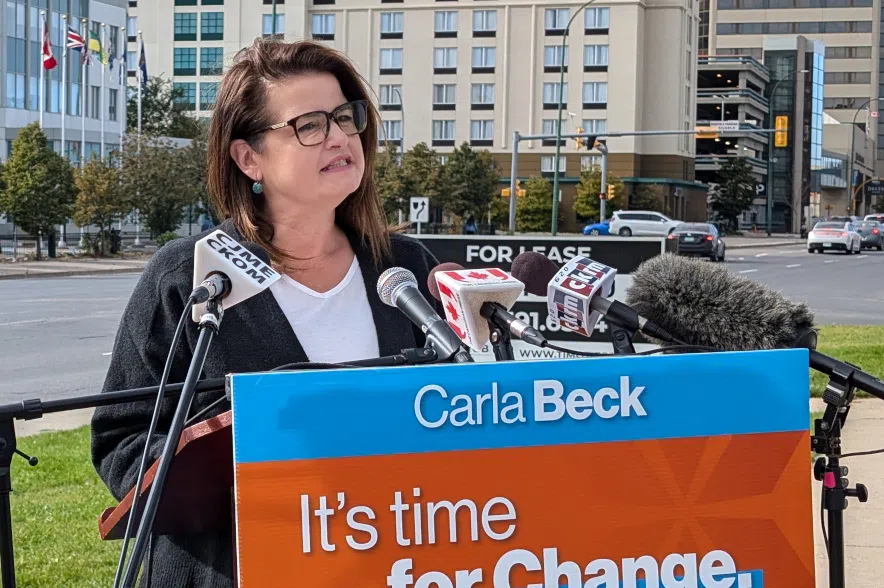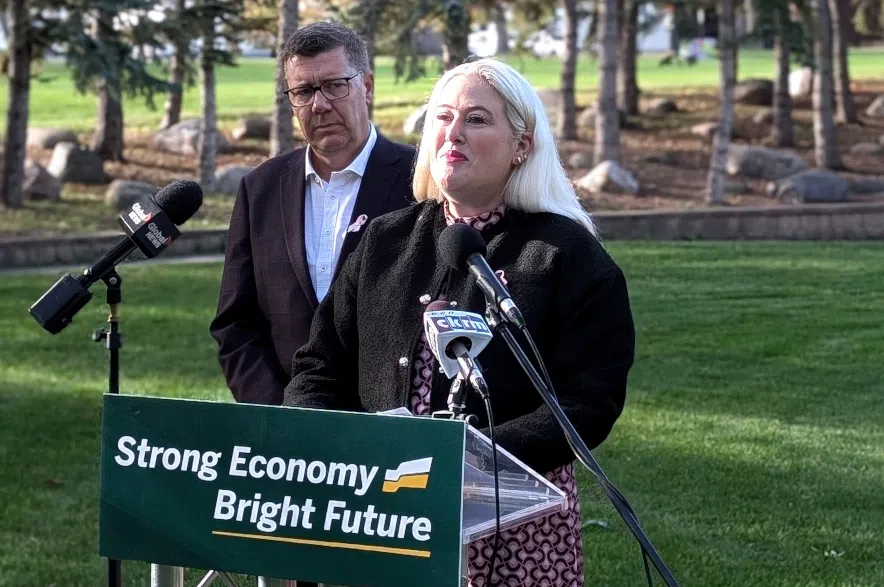The Sask. Party started off another week of campaigning on Monday by focusing on women’s health and growing families.
On Monday morning, Scott Moe announced new promises while flanked by his party’s Regina Lakeview candidate Sarah Wright, and his party’s Regina Rochdale candidate Laura Ross — both the women are cancer survivors.
The two helped announced two new promises from the Sask. Party: to provide at-home self-administer testing for HPV for women across the province, and a partial tax credit for fertility treatments, like in vitro fertilization (IVF).
Read more
- Sask Votes 2024: Find our comprehensive provincial election coverage here
- Sask. Votes 2024: Battlegrounds in Saskatoon
- Sask. Votes 2024: Battleground ridings in Regina
Wright told a story about using her time between cancer treatments last year to think about how the government could help patients, and how she took those ideas to the Sask. Party government of the day.
The at-home testing kits will be delivered to women in the province between the ages of 25 and 69 who want them and will screen for HPV, which is the cause of the vast majority of cervical cancers. The test is being framed as an alternative to a woman going to a doctor for a PAP test.
Wright said it’s about early prevention and saving lives.
“If you can find the cancer, remove the cancer, you’re then cancer-free — and that’s what this is all about,” she explained.
Ross compared it to the at-home testing kits the provincial government began sending out for colorectal cancer in 2009.
“That’s one of the reasons why we are going down this way of providing more health care in a friendlier way, to be honest, being able to do this in the privacy of your own home really makes a big difference,” said Ross.
The program is expected to cost between $3.5 and $4 million.
B.C. is the only other province which offers at-home testing for HPV.
Moe, Wright and Ross also announced a new refundable tax credit to give people back some of the high cost of fertility treatments.
The tax credit would reimburse half of a first fertility treatment embarked upon in Saskatchewan, up to a cost of $20,000, for a return of $10,000 to the taxpayer.
“We want to make it more affordable for women, for couples, and for families who may be in need of fertility treatments to start or grow their families right here in our province,” said Moe.
An IVF treatment in Saskatchewan can cost anywhere between $8,000 and $15,000 for most people.
A tax credit requires a person to have paid for the service already, and then to claim the money back in their tax return. Moe didn’t have a direct answer as to why the party chose to go to a tax credit as opposed to simply covering the treatments under the provincial health plan.
“It’s much more than we had before, and much more than virtually any other province has as well,” said Moe.
Most other provinces cover some sort of fertility treatments but coverage ranges in dollar amounts, how many cycles of treatment would be eligible, and whether it’s funded through the health system or a tax credit. Alberta and Saskatchewan current don’t fund fertility treatments, neither do the territories.
The NDP’s Aleana Young has been calling for health coverage of IVF since 2020. When asked why his government didn’t work with the NDP to get something done on that subject sooner, Moe said this is what the Sask Party is doing now — part of a suite of initiatives.
“This is part of a larger initiative focused around, in this case, women’s health but even, I would say, a larger initiative around improving … Saskatchewan people’s access to health care,” said Moe.
He said the NDP will have its commitments, and the Sask. Party will have its commitments, and there might possibly be some points of alignment too.

Sask. NDP leader Carla Beck says an NDP government will add 200 police officers – municipal and RCMP – to the province as soon as possible. Photo taken in Regina on Oct. 7, 2024. (Lisa Schick/980 CJME)
More police, scrapping marshals in NDP plan
Before heading out on a ride-along with RCMP officers Monday afternoon, NDP leader Carla Beck talked about her party’s plan to deal with crime in the province.
The plan includes addressing the root causes of crime, supporting police and adding more officers, as well as offering rebates for security equipment.
On mental health and addictions, Beck said her party would consider looking at anything that’s effective, including involuntary addictions treatment.
“We are open to effective responses on all fronts, this can’t be one-size-fits-all,” said Beck, adding that it would need to be paired with other programs and initiatives.
Beck attacked the Sask. Party’s record on the issue. She said when the party’s government heard about concerns on crime and safety, it decided to create a marshals service which she said no one asked for.
“(The service has) already spent $14 million, and even when (the Sask. Party government) announced that plan in 2022 their plan wouldn’t deliver an additional officer on the streets for eight additional years. It’s not the way that you address something that is such a crisis in communities as growing crime rates,” said Beck.
She said the NDP would scrap that service, and take half that money and invest it in hiring 100 more police officers in municipal service as soon as possible, while also working the RCMP to hire 100 more Mounties in the province, also as soon as possible.
“We would be full partners and work with them to address the challenges that they have faced when it comes to recruitment,” said Beck.
Beck said the rebates on security equipment like cameras and lights would help businesses, people, and places of worship to improve their safety.
SHA’s AIMS program has cost $203 million
The Sask. NDP did double-duty on Monday with a second announcement, this one about the embattled AIMS payroll and logistics system in the Sask. Health Authority.
The AIMS system has been making headlines for weeks with health-care workers frustrated that they either aren’t getting paid on time, or at all, and frustrated over problems with inventory and running out of equipment.
On Monday, the NDP released numbers, obtained through a Freedom of Information application, which showed the system has cost $203 million. In 2018 the system was announced with a price tag of $86 million.
“AIMS has put patients at risk and wasted hundreds of millions of dollars — and who knows what the final cost to taxpayers will actually be?” said NDP Regina Douglas Park candidate Nicole Sarauer in a news release.
“We are still hearing from frontline health-care workers who tell us they can’t get critical equipment they need to do their jobs and save lives.”
According to the provincial auditor in December, the estimated total cost of the program is $240 million.
Sarauer promised, under an NDP government, that an accountability commission would be launched to investigate “failed Sask. Party projects” like the AIMS program.
Read more











